University Counseling Case Study: Cultural Competency Analysis
VerifiedAdded on 2021/06/14
|6
|1319
|151
Case Study
AI Summary
This case study examines the cultural competency required in counseling, focusing on the case of Geoffrey, a 56-year-old Aboriginal Australian man facing challenges related to alcoholism, drug abuse, divorce, depression, and feelings of worthlessness. The assignment highlights the importance of understanding Geoffrey's cultural background, including Aboriginal values, beliefs, and experiences with substance abuse and family relationships. It emphasizes the need for counselors to avoid stereotypes and approach Geoffrey with sensitivity, respecting his cultural identity and past experiences. The case study suggests practical steps for counselors, such as creating connections with his community, facilitating productive activities, and addressing his financial health. The analysis references key literature on Indigenous psychology and cultural competence, emphasizing the importance of culturally informed approaches to counseling and mental health care. The assignment also stresses the need for counselors to develop innovative approaches to address the unique needs of their clients.
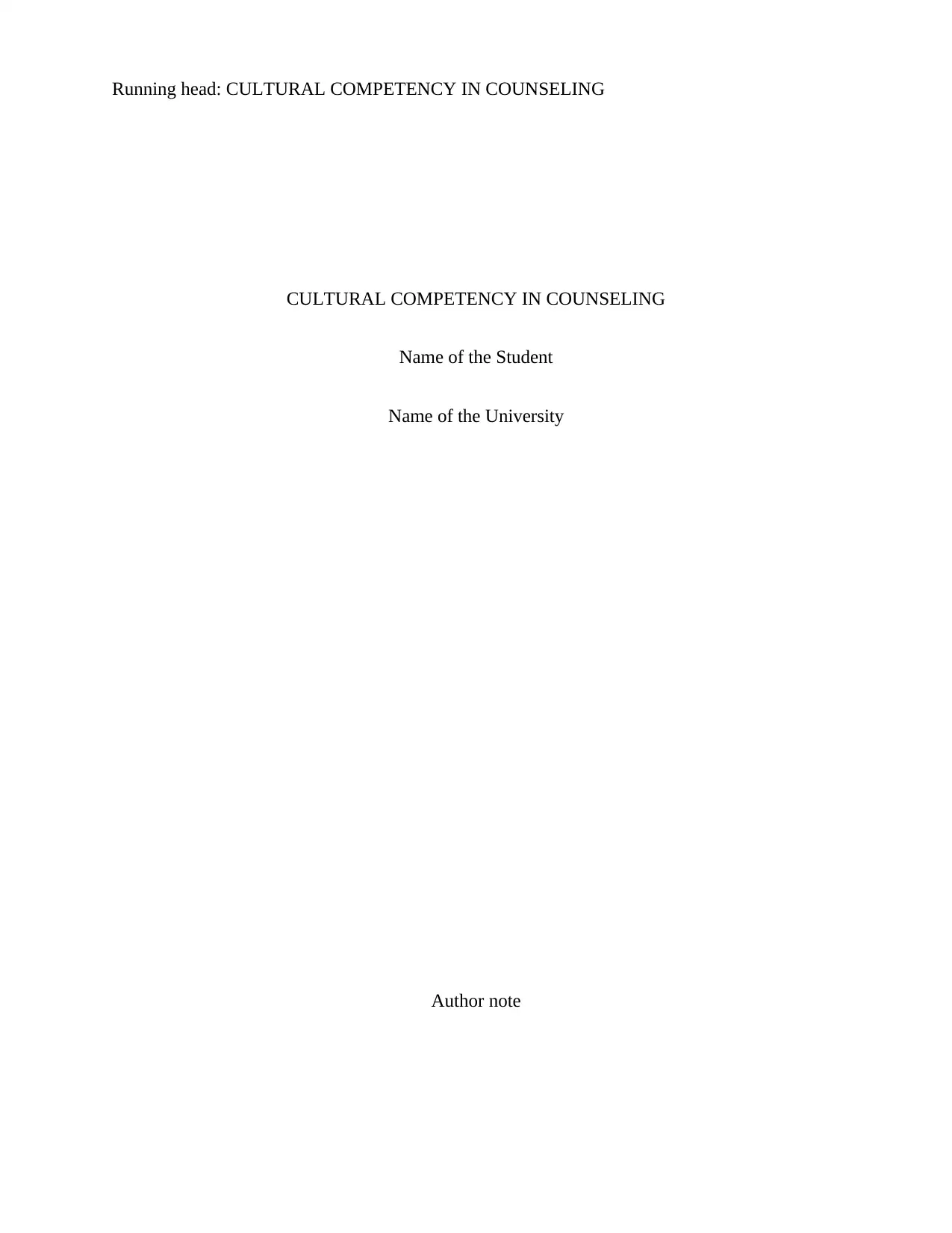
Running head: CULTURAL COMPETENCY IN COUNSELING
CULTURAL COMPETENCY IN COUNSELING
Name of the Student
Name of the University
Author note
CULTURAL COMPETENCY IN COUNSELING
Name of the Student
Name of the University
Author note
Paraphrase This Document
Need a fresh take? Get an instant paraphrase of this document with our AI Paraphraser
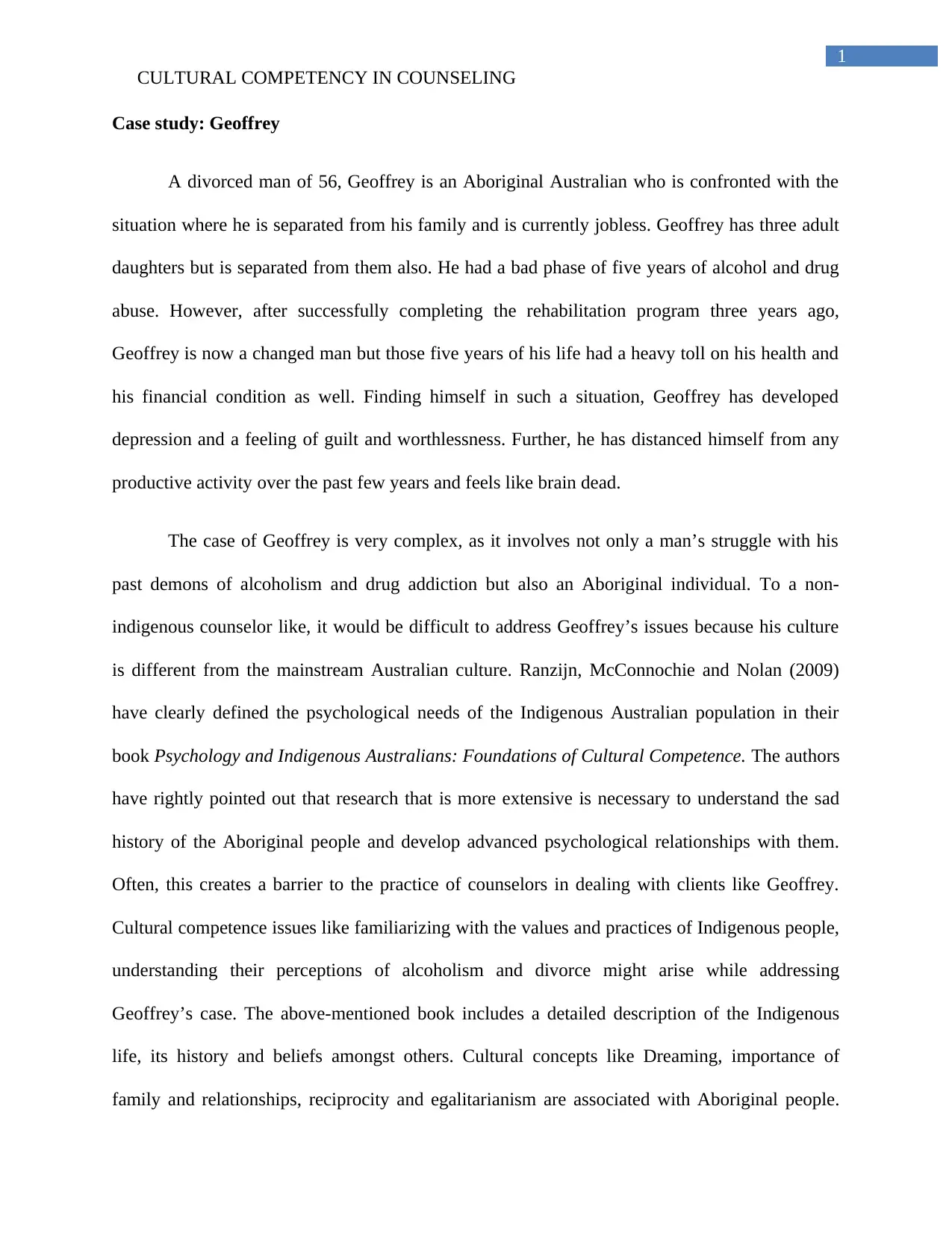
1
CULTURAL COMPETENCY IN COUNSELING
Case study: Geoffrey
A divorced man of 56, Geoffrey is an Aboriginal Australian who is confronted with the
situation where he is separated from his family and is currently jobless. Geoffrey has three adult
daughters but is separated from them also. He had a bad phase of five years of alcohol and drug
abuse. However, after successfully completing the rehabilitation program three years ago,
Geoffrey is now a changed man but those five years of his life had a heavy toll on his health and
his financial condition as well. Finding himself in such a situation, Geoffrey has developed
depression and a feeling of guilt and worthlessness. Further, he has distanced himself from any
productive activity over the past few years and feels like brain dead.
The case of Geoffrey is very complex, as it involves not only a man’s struggle with his
past demons of alcoholism and drug addiction but also an Aboriginal individual. To a non-
indigenous counselor like, it would be difficult to address Geoffrey’s issues because his culture
is different from the mainstream Australian culture. Ranzijn, McConnochie and Nolan (2009)
have clearly defined the psychological needs of the Indigenous Australian population in their
book Psychology and Indigenous Australians: Foundations of Cultural Competence. The authors
have rightly pointed out that research that is more extensive is necessary to understand the sad
history of the Aboriginal people and develop advanced psychological relationships with them.
Often, this creates a barrier to the practice of counselors in dealing with clients like Geoffrey.
Cultural competence issues like familiarizing with the values and practices of Indigenous people,
understanding their perceptions of alcoholism and divorce might arise while addressing
Geoffrey’s case. The above-mentioned book includes a detailed description of the Indigenous
life, its history and beliefs amongst others. Cultural concepts like Dreaming, importance of
family and relationships, reciprocity and egalitarianism are associated with Aboriginal people.
CULTURAL COMPETENCY IN COUNSELING
Case study: Geoffrey
A divorced man of 56, Geoffrey is an Aboriginal Australian who is confronted with the
situation where he is separated from his family and is currently jobless. Geoffrey has three adult
daughters but is separated from them also. He had a bad phase of five years of alcohol and drug
abuse. However, after successfully completing the rehabilitation program three years ago,
Geoffrey is now a changed man but those five years of his life had a heavy toll on his health and
his financial condition as well. Finding himself in such a situation, Geoffrey has developed
depression and a feeling of guilt and worthlessness. Further, he has distanced himself from any
productive activity over the past few years and feels like brain dead.
The case of Geoffrey is very complex, as it involves not only a man’s struggle with his
past demons of alcoholism and drug addiction but also an Aboriginal individual. To a non-
indigenous counselor like, it would be difficult to address Geoffrey’s issues because his culture
is different from the mainstream Australian culture. Ranzijn, McConnochie and Nolan (2009)
have clearly defined the psychological needs of the Indigenous Australian population in their
book Psychology and Indigenous Australians: Foundations of Cultural Competence. The authors
have rightly pointed out that research that is more extensive is necessary to understand the sad
history of the Aboriginal people and develop advanced psychological relationships with them.
Often, this creates a barrier to the practice of counselors in dealing with clients like Geoffrey.
Cultural competence issues like familiarizing with the values and practices of Indigenous people,
understanding their perceptions of alcoholism and divorce might arise while addressing
Geoffrey’s case. The above-mentioned book includes a detailed description of the Indigenous
life, its history and beliefs amongst others. Cultural concepts like Dreaming, importance of
family and relationships, reciprocity and egalitarianism are associated with Aboriginal people.
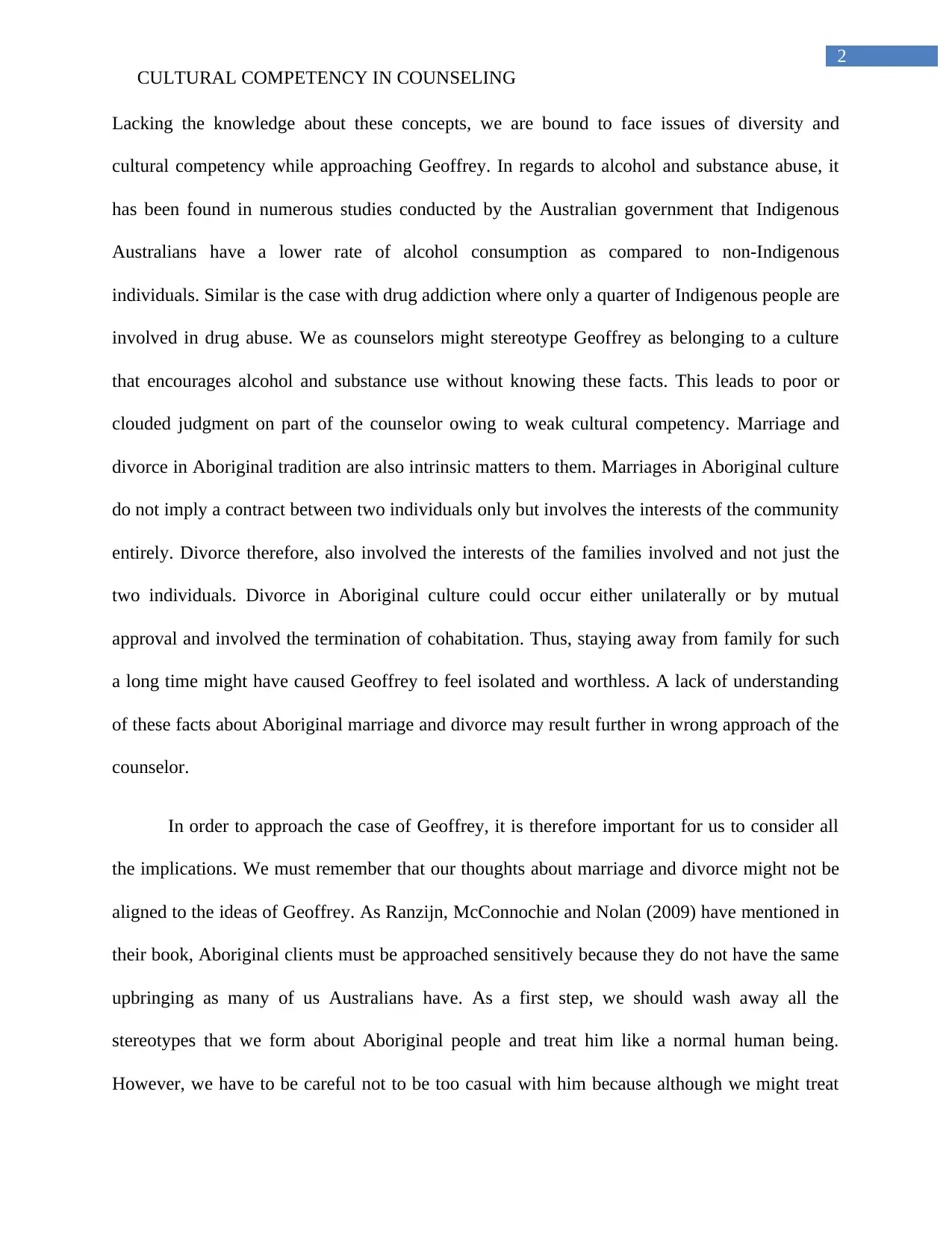
2
CULTURAL COMPETENCY IN COUNSELING
Lacking the knowledge about these concepts, we are bound to face issues of diversity and
cultural competency while approaching Geoffrey. In regards to alcohol and substance abuse, it
has been found in numerous studies conducted by the Australian government that Indigenous
Australians have a lower rate of alcohol consumption as compared to non-Indigenous
individuals. Similar is the case with drug addiction where only a quarter of Indigenous people are
involved in drug abuse. We as counselors might stereotype Geoffrey as belonging to a culture
that encourages alcohol and substance use without knowing these facts. This leads to poor or
clouded judgment on part of the counselor owing to weak cultural competency. Marriage and
divorce in Aboriginal tradition are also intrinsic matters to them. Marriages in Aboriginal culture
do not imply a contract between two individuals only but involves the interests of the community
entirely. Divorce therefore, also involved the interests of the families involved and not just the
two individuals. Divorce in Aboriginal culture could occur either unilaterally or by mutual
approval and involved the termination of cohabitation. Thus, staying away from family for such
a long time might have caused Geoffrey to feel isolated and worthless. A lack of understanding
of these facts about Aboriginal marriage and divorce may result further in wrong approach of the
counselor.
In order to approach the case of Geoffrey, it is therefore important for us to consider all
the implications. We must remember that our thoughts about marriage and divorce might not be
aligned to the ideas of Geoffrey. As Ranzijn, McConnochie and Nolan (2009) have mentioned in
their book, Aboriginal clients must be approached sensitively because they do not have the same
upbringing as many of us Australians have. As a first step, we should wash away all the
stereotypes that we form about Aboriginal people and treat him like a normal human being.
However, we have to be careful not to be too casual with him because although we might treat
CULTURAL COMPETENCY IN COUNSELING
Lacking the knowledge about these concepts, we are bound to face issues of diversity and
cultural competency while approaching Geoffrey. In regards to alcohol and substance abuse, it
has been found in numerous studies conducted by the Australian government that Indigenous
Australians have a lower rate of alcohol consumption as compared to non-Indigenous
individuals. Similar is the case with drug addiction where only a quarter of Indigenous people are
involved in drug abuse. We as counselors might stereotype Geoffrey as belonging to a culture
that encourages alcohol and substance use without knowing these facts. This leads to poor or
clouded judgment on part of the counselor owing to weak cultural competency. Marriage and
divorce in Aboriginal tradition are also intrinsic matters to them. Marriages in Aboriginal culture
do not imply a contract between two individuals only but involves the interests of the community
entirely. Divorce therefore, also involved the interests of the families involved and not just the
two individuals. Divorce in Aboriginal culture could occur either unilaterally or by mutual
approval and involved the termination of cohabitation. Thus, staying away from family for such
a long time might have caused Geoffrey to feel isolated and worthless. A lack of understanding
of these facts about Aboriginal marriage and divorce may result further in wrong approach of the
counselor.
In order to approach the case of Geoffrey, it is therefore important for us to consider all
the implications. We must remember that our thoughts about marriage and divorce might not be
aligned to the ideas of Geoffrey. As Ranzijn, McConnochie and Nolan (2009) have mentioned in
their book, Aboriginal clients must be approached sensitively because they do not have the same
upbringing as many of us Australians have. As a first step, we should wash away all the
stereotypes that we form about Aboriginal people and treat him like a normal human being.
However, we have to be careful not to be too casual with him because although we might treat
⊘ This is a preview!⊘
Do you want full access?
Subscribe today to unlock all pages.

Trusted by 1+ million students worldwide
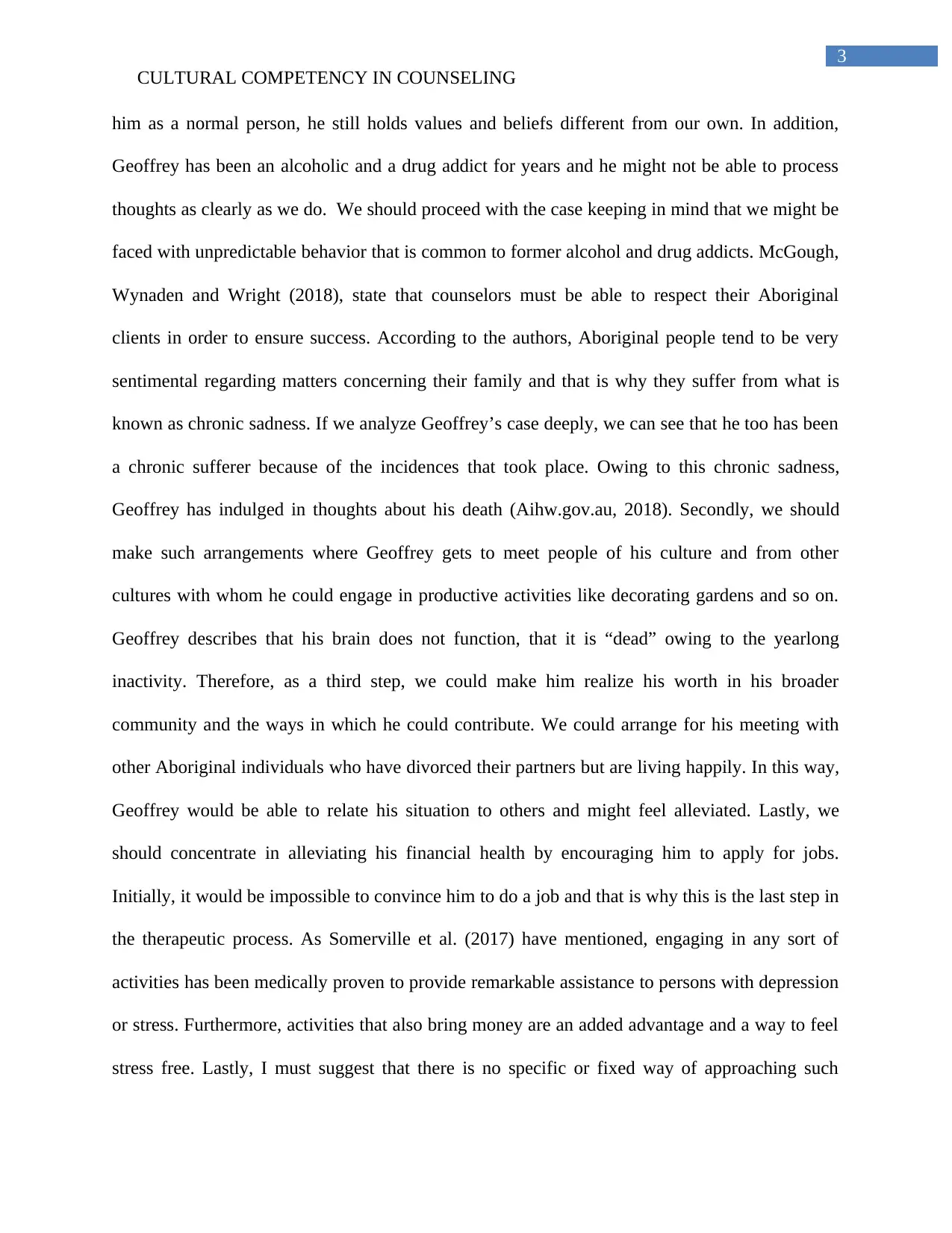
3
CULTURAL COMPETENCY IN COUNSELING
him as a normal person, he still holds values and beliefs different from our own. In addition,
Geoffrey has been an alcoholic and a drug addict for years and he might not be able to process
thoughts as clearly as we do. We should proceed with the case keeping in mind that we might be
faced with unpredictable behavior that is common to former alcohol and drug addicts. McGough,
Wynaden and Wright (2018), state that counselors must be able to respect their Aboriginal
clients in order to ensure success. According to the authors, Aboriginal people tend to be very
sentimental regarding matters concerning their family and that is why they suffer from what is
known as chronic sadness. If we analyze Geoffrey’s case deeply, we can see that he too has been
a chronic sufferer because of the incidences that took place. Owing to this chronic sadness,
Geoffrey has indulged in thoughts about his death (Aihw.gov.au, 2018). Secondly, we should
make such arrangements where Geoffrey gets to meet people of his culture and from other
cultures with whom he could engage in productive activities like decorating gardens and so on.
Geoffrey describes that his brain does not function, that it is “dead” owing to the yearlong
inactivity. Therefore, as a third step, we could make him realize his worth in his broader
community and the ways in which he could contribute. We could arrange for his meeting with
other Aboriginal individuals who have divorced their partners but are living happily. In this way,
Geoffrey would be able to relate his situation to others and might feel alleviated. Lastly, we
should concentrate in alleviating his financial health by encouraging him to apply for jobs.
Initially, it would be impossible to convince him to do a job and that is why this is the last step in
the therapeutic process. As Somerville et al. (2017) have mentioned, engaging in any sort of
activities has been medically proven to provide remarkable assistance to persons with depression
or stress. Furthermore, activities that also bring money are an added advantage and a way to feel
stress free. Lastly, I must suggest that there is no specific or fixed way of approaching such
CULTURAL COMPETENCY IN COUNSELING
him as a normal person, he still holds values and beliefs different from our own. In addition,
Geoffrey has been an alcoholic and a drug addict for years and he might not be able to process
thoughts as clearly as we do. We should proceed with the case keeping in mind that we might be
faced with unpredictable behavior that is common to former alcohol and drug addicts. McGough,
Wynaden and Wright (2018), state that counselors must be able to respect their Aboriginal
clients in order to ensure success. According to the authors, Aboriginal people tend to be very
sentimental regarding matters concerning their family and that is why they suffer from what is
known as chronic sadness. If we analyze Geoffrey’s case deeply, we can see that he too has been
a chronic sufferer because of the incidences that took place. Owing to this chronic sadness,
Geoffrey has indulged in thoughts about his death (Aihw.gov.au, 2018). Secondly, we should
make such arrangements where Geoffrey gets to meet people of his culture and from other
cultures with whom he could engage in productive activities like decorating gardens and so on.
Geoffrey describes that his brain does not function, that it is “dead” owing to the yearlong
inactivity. Therefore, as a third step, we could make him realize his worth in his broader
community and the ways in which he could contribute. We could arrange for his meeting with
other Aboriginal individuals who have divorced their partners but are living happily. In this way,
Geoffrey would be able to relate his situation to others and might feel alleviated. Lastly, we
should concentrate in alleviating his financial health by encouraging him to apply for jobs.
Initially, it would be impossible to convince him to do a job and that is why this is the last step in
the therapeutic process. As Somerville et al. (2017) have mentioned, engaging in any sort of
activities has been medically proven to provide remarkable assistance to persons with depression
or stress. Furthermore, activities that also bring money are an added advantage and a way to feel
stress free. Lastly, I must suggest that there is no specific or fixed way of approaching such
Paraphrase This Document
Need a fresh take? Get an instant paraphrase of this document with our AI Paraphraser

4
CULTURAL COMPETENCY IN COUNSELING
clients; counselors must and will develop innovative ways to address such issues as they
progress.
CULTURAL COMPETENCY IN COUNSELING
clients; counselors must and will develop innovative ways to address such issues as they
progress.
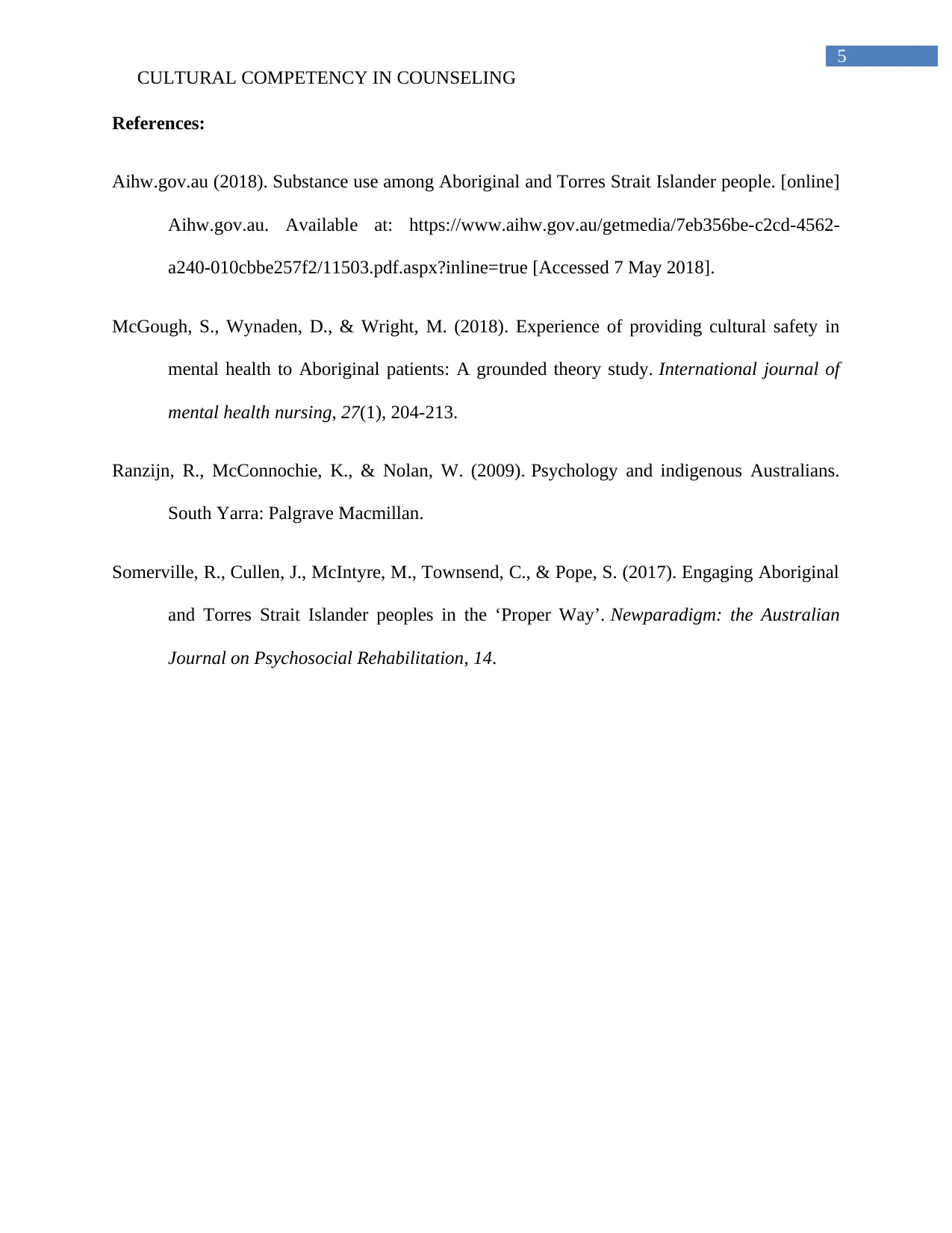
5
CULTURAL COMPETENCY IN COUNSELING
References:
Aihw.gov.au (2018). Substance use among Aboriginal and Torres Strait Islander people. [online]
Aihw.gov.au. Available at: https://www.aihw.gov.au/getmedia/7eb356be-c2cd-4562-
a240-010cbbe257f2/11503.pdf.aspx?inline=true [Accessed 7 May 2018].
McGough, S., Wynaden, D., & Wright, M. (2018). Experience of providing cultural safety in
mental health to Aboriginal patients: A grounded theory study. International journal of
mental health nursing, 27(1), 204-213.
Ranzijn, R., McConnochie, K., & Nolan, W. (2009). Psychology and indigenous Australians.
South Yarra: Palgrave Macmillan.
Somerville, R., Cullen, J., McIntyre, M., Townsend, C., & Pope, S. (2017). Engaging Aboriginal
and Torres Strait Islander peoples in the ‘Proper Way’. Newparadigm: the Australian
Journal on Psychosocial Rehabilitation, 14.
CULTURAL COMPETENCY IN COUNSELING
References:
Aihw.gov.au (2018). Substance use among Aboriginal and Torres Strait Islander people. [online]
Aihw.gov.au. Available at: https://www.aihw.gov.au/getmedia/7eb356be-c2cd-4562-
a240-010cbbe257f2/11503.pdf.aspx?inline=true [Accessed 7 May 2018].
McGough, S., Wynaden, D., & Wright, M. (2018). Experience of providing cultural safety in
mental health to Aboriginal patients: A grounded theory study. International journal of
mental health nursing, 27(1), 204-213.
Ranzijn, R., McConnochie, K., & Nolan, W. (2009). Psychology and indigenous Australians.
South Yarra: Palgrave Macmillan.
Somerville, R., Cullen, J., McIntyre, M., Townsend, C., & Pope, S. (2017). Engaging Aboriginal
and Torres Strait Islander peoples in the ‘Proper Way’. Newparadigm: the Australian
Journal on Psychosocial Rehabilitation, 14.
⊘ This is a preview!⊘
Do you want full access?
Subscribe today to unlock all pages.

Trusted by 1+ million students worldwide
1 out of 6
Related Documents
Your All-in-One AI-Powered Toolkit for Academic Success.
+13062052269
info@desklib.com
Available 24*7 on WhatsApp / Email
![[object Object]](/_next/static/media/star-bottom.7253800d.svg)
Unlock your academic potential
Copyright © 2020–2026 A2Z Services. All Rights Reserved. Developed and managed by ZUCOL.





